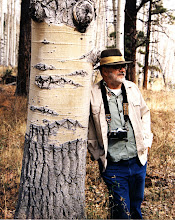
My father was one of what Tom Brokaw called the Greatest Generation. He came from a mining town and was the only one in his family to go to college. He worked in the mines during the great depression and did whatever it took to get enough money to finish college. He got an Army ROTC commission along the way, and was called to active duty for one year on January 1, 1941. That one year turned into six years. The photo above shows my father sitting on the ground holding me between his legs. I was about two and one-half years old.
When I was about three and one-half he went overseas. He made the D-Day landing in North Africa(Casablanca), then went to Tunisia. He next made D-Day at Sicily. He and his unit didn't make the Italian invasion but went to Italy 30 days later and fought their way up the peninsula, including the six or seven month battle of Monte Casino. His outfit was then pulled out and they made another D-Day, this time in Southern France. He ended the war in Germany at Berchtesgaden. In almost three years of combat he was not physically wounded despite being blown out of a jeep by bombs and having more than one concussion by bombs or artillery.

My father returned when I was six years old. My grandparents, mother and I went to the train station to meet hm. All these soldiers were coming into the station from the train. I kept looking for my Daddy, saying to myself "That's not my Daddy, that's not my Daddy" and then one of the "that's not my Daddys" was kissing my mother. I had not recognized him at all , despite the photos that had been sent home. My mother said "Mike this is your Daddy." I put out my hand and said "How do you do."
I have almost no memories of the first two years he was home. Years later I asked my mother if that time was really that difficult that I would suppress it that successfully. She said it was very hard for all of us, particularly him. He was not the same man that had left for war. At that time there was no such thing as post traumatic stress syndrome. The soldiers were supposed to come home and resume civilian life as if nothing had changed. Of course everything had changed.
He didn't like being confined by an office and preferred to be traveling or calling on farmers and ranchers, which fortunately he was able to do in his work. One day probably three years after the war we were sitting at the dinner table when one of those big, loud house shaking claps of thunder went off. He dived under the table.
He would talk about the war only with friends who were veterans. When they got together you couldn't pry me from the room with a crowbar. They only talked about funny things that had happened, never the bad things. Years later he told me about some bad things, like being knocked unconscious by bomb explosions, but then in even later years denied that it had happened.
He wanted to reach out to his son, but didn't know how or couldn't because of fear that he would get attached and then suffer a loss. I probably didn't make it easy for him. I'm sure I had expectations that Superman couldn't have met. The hugging, smiling Daddy no longer existed. I did not get a spontaneous hug from him until just a few years before his death at age 94. The night before he died he asked for a hug and a kiss, the first I can recall since that little prewar boy.
My father was not killed in defense of his country nor did he receive a Purple Heart for any physical wounds, and he would be he first to scoff at a Purple Heart for post traumatic stress syndrome. Wounds that last a lifetime are not necessarily physical. He gave his life for his country and family and was proud to have done so. He never considered himself a hero--he always aid the heroes were killed in combat. You are my hero. I love you.
Thanks, Dad


A note about the photos. The one with dad sitting on the ground is scanned from an old family album. Dad is the soldier on the right in the combat gear, I believe taken in Sicily, also scanned from the family collection. The little boy and the soldier is from a card sent to me by one of my daughters, and while not me or my father, it does look like him. Photo storage-photos should not be glued in albums. They shuld be in archival acid free containers.
ReplyDeleteFortunately we wee able to rescue most of our family's old photos.
I absolutely adore the first photo. What a cute blondie. Where was it taken?
ReplyDeleteIt's a lovely tribute. Thank you for sharing it. My favorite line is "He gave his life for his country and family and was proud to have done so." Very true.
I've been in the Vosges Mountains today, so I've been thinking about him.
That photo was taken on a picnic in the Mojave desert, near a place called Elsinore in 1941. He was stationed at Camp Hahn,near Riverside.
ReplyDeleteBloodless wounds are the hardest to heal. Nice read.
ReplyDeleteI love the pictures. I was almost convinced the last one was grandpa, except that the little boy didn't look like you. I love the little blondie of the first photo. (Is it just me or are there some pictures of me at that age with the same expression and face?) Lovely post. Thank you. He really did give his life as you say.
ReplyDelete